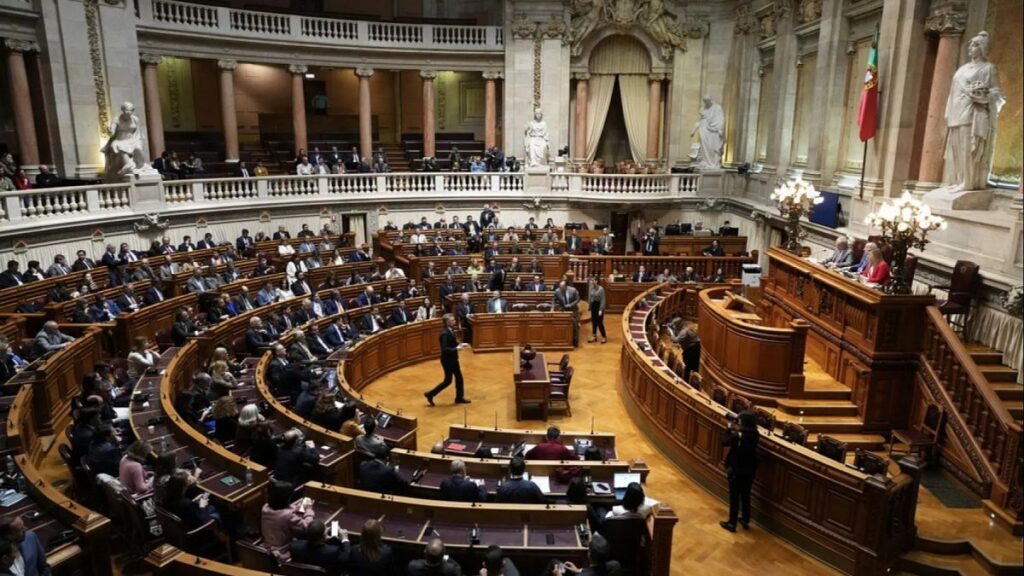As Portugal gears up for snap legislative elections scheduled for 18 May, it is witnessing an uptick in misleading claims by politicians and social media users alike.
Some relate to the amount of support each political party is getting, such as a post on X by André Ventura, leader of the far-right party Chega.
He says that social media polls put his party as most likely to come out on top in May, roughly five points ahead on the centre-right AD alliance led by the Social Democratic Party (PSD) and nine points ahead of the Socialist Party.
“Social media doesn’t lie,” Ventura says in the post.
It’s unclear exactly what the source for the poll is, but regardless, social media surveys are notoriously unreliable.
More reputable polling from various credible companies puts AD at about 30%, the Socialist Party in the high 20s, and then Chega in third place with around 15%.
Nevertheless, Chega has indeed attracted enough support to become a solid political force in Portugal in recent years.
The polls show that Chega has consistently grown since the turn of the decade, and last year’s vote saw the party surge into third place, becoming the best-performing third-place party in recent years.
Ventura claimed in a recent televised debate that the Social Democratic Party, the Socialist Party and Chega came “historically close” to each other in the 2024 elections. Chega hopes to do even better in this year’s snap election, which follow the collapse of Prime Minister Luís Montenegro’s centre-right minority government in March.
That government, formed by the AD alliance between the PSD and the CDS People’s Party, lost a parliamentary confidence vote amid a scandal involving Montenegro’s family consultancy firm, Spinumviva, which received payments from companies with government concessions.
Montenegro has denied any wrongdoing, yet the controversy eroded his political support, leading to the government’s fall. May’s vote marks Portugal’s third national election in three years, reflecting ongoing political instability and public frustration with the traditional parties.
Combating election misinformation
Regardless, with the 2025 elections on the horizon, Portugal is preparing for a deluge of misinformation linked to the vote by setting up a rapid response system to report dubious claims.
According to local reports, a similar system has already been used in countries across Europe, allowing organisations to quickly flag urgent content or trends that could threaten election integrity and discuss them with platforms based on their policies.
The rapid response system, under the EU’s Code of Practice on Disinformation, was used in last year’s European elections and issued 18 notifications in the campaign before the vote, according to the European Digital Media Observatory (EDMO).
It said that the notifications were addressed to different social media platforms: seven to Meta, six to YouTube, and five to TikTok, which gave feedback for all 18 notifications.
As a result of the rapid response system’s efforts, there were 12 instances of content or accounts being removed or banned, either partially or entirely.
One of the most common targets for misinformation when election time rolls around is the issue of immigration.
EuroVerify has also already previously debunked immigration misinformation in Portugal, specifically misleading claims by Ventura that 20% of Portugal’s current prisoners are foreigners.
However, statistics by Portugal’s internal security agency for the year 2023 showed that the vast majority of the country’s prisoners are Portuguese (83.3%) and that foreigners accounted for 16.7%.
Ventura has more recently taken to X to once again claim there’s a link between immigration and crime. He said that Portugal “imports criminals and still pays them subsidies”, criticising migrants’ access to benefits in the process.
Firstly, it’s worth noting that Ventura is referring to the Santa Casa da Misericórdia, a historic Portuguese charity founded more than 500 years ago that runs hospitals, supports the poor and manages the national lottery (using the money to fund social programmes), among other initiatives.
While it’s technically private, it’s supervised by the government and helps carry out social welfare policies, and is funded through a mix of public revenue, business activities and donations, but its main source of funding is the national lottery system.
Putting Santa Casa aside and looking at the wider benefits system, in addition to the statistics from the internal security agency, Portuguese law says that immigrants qualify for social benefits only after fulfilling certain requirements.
For example, Portugal’s social integration income benefit is designed only for those in extreme poverty. They must have had legal residence for at least one year, have an income below the national threshold (€242.23) and must take part in an integration programme.
Therefore, it’s disingenuous to suggest that Portugal imports and immediately “subsidises” criminals.
Read the full article here

